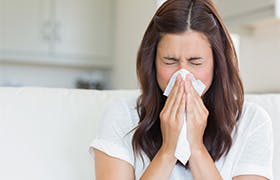
All About Colds: Prevention, Symptoms, Treatment.
The common cold is a frustrating beast – there is no “cure” for it, you just have to wait for it to pass. Thankfully, cold symptoms are often mild, and cuddling up in blankets with a film and a hot cocoa can help.
Find out everything you need to know about colds here, from what they are, if they can be prevented, and how to treat them, with Otrivine.
What is a Cold?
Colds are caused by viruses, meaning they are easily transmitted to other people. While you still have cold symptoms, you can pass the virus to others. Colds often clear up by themselves within 1-2 weeks, so you shouldn’t be out of action for long.
Common cold symptoms can include:
- A runny/blocked nose
- Coughing
- Sneezing
- Sore throat
- Headaches
- Muscle aches
- Raised temperature
- Pressure in your face and ears
- Loss of smell and taste
Sneezing and coughing around others while you’re infectious causes germs to spread – the virus can even live on surfaces for 24 hours. You can help prevent spreading your cold by staying away from others while you’re ill, coughing and sneezing into tissues before putting them straight in the bin, and washing your hands regularly.
Can Colds be Prevented?
You can’t always protect yourself from getting a cold. Unfortunately, wrapping up warm in the winter and keeping your distance from people with the sniffles can’t guarantee you won’t get ill. However, you can help keep yourself safe from colds by:
- Washing your hands often
- Using your own cups, cutlery, towels, etc. – not sharing with others
- Not touching your eyes, nose, or face, as the virus can infect you this way
- Keeping fit and healthy with a good diet and exercise routine to maintain your immune system
How to Help Get Rid of a Cold
There are plenty of cold remedies out there to help you feel better when you’ve fallen ill with the latest cold circulating the office. It’s all about finding what helps your symptoms. And if you pass it on to family members, housemates or children at home, there are treatments that can help them out too.
Some common cold remedies to try are:
- Drink lots of water – dehydration will only make you feel worse. Plus, getting plenty of liquids can help loosen up any congestion or mucus in your nose and throat, which will definitely have you feeling cheerier.
- Clear nasal congestion – nasal sprays and drops help clear your nasal airways so you can breathe your best, getting you feeling more like yourself again. Explore the Otrivine range.
- Rest – go on, take that sick day and stay in bed. Not only does your body need rest to fight off the cold virus, it’s best not to spread your germs by going out and about.
- Pain relief – paracetamol can help soothe head and body aches while also reducing a fever. Always read the instructions and follow the correct dosages for different age groups.
- Humidify the air – using a humidifier or vaporiser to add moisture to the air can help loosen congestion.
How Otrivine Can Help Relieve Your Cold Symptoms
Otrivine products relieve your stuffy, blocked nose when you have a cold with active decongestant ingredients. Our medicated products, including Otrivine Blocked Nose Relief Nasal Spray and Otrivine Child Nasal Drops, contain xylometazoline hydrochloride which reduces swelling in the nasal cavity and opens up your nasal passages to help you breathe your best and relieve sinus pressure.
Our Extra Dual Relief Nasal Spray also contains ipratropium bromide to reduce nasal mucus production, helping to both open your airways and dial down the snottiness when you have a nasty cold.
How long does a cold last for?
Colds usually go away on their own within 1-2 weeks and don’t generally need help from a doctor. You can get over-the-counter remedies from your pharmacy like Otrivine sprays and drops to relieve nasal congestion if needed.
However, if your cold lasts for 3 weeks or more, talk to your GP as there may be another condition causing your symptoms. Antibiotics may be needed, but only if it’s determined that you have a bacterial infection – viruses cannot be treated with antibiotics, and they will be ineffective against a common cold.
How can I sleep with a cold?
Sometimes it can feel like your cold symptoms get worse at night – coughs can feel worse at bedtime due to increased postnasal drip (mucus running down your throat instead of out of the nose) as you lie down.
If a stuffy nose is keeping you up at night, try Otrivine Congestion Relief Nasal Spray before bed to help unblock your nasal passages so you can get some rest. Other tips for sleeping better while you have a cold include staying hydrated, elevating your head with extra pillows in bed, and moistening the air in your bedroom with a humidifier.
What are the stages of a cold?
Cold stages will differ from person to person, but you may find your cold progressing like this:
Days 1-2.
You're probably blissfully unaware you've been infected with a cold virus. No symptoms yet.
Days 2-3.
You might start sneezing, feeling a bit tired and achy, getting the beginnings of a sore throat, and generally becoming aware you’ve got a cold coming on. It’s at this point that you should prepare: grab your Otrivine nasal decongestants and cough syrups, stock up on soup, and spend the next few days in bed to avoid spreading the lurgy.
Days 3-4.
By now, you’re probably fully bunged-up, and the stuff coming out of your nose may have become a very unpleasant colour. Be sure to keep clearing your airways with steam to help prevent a sinus infection.
Days 4-6.
Inflammation in your airways may have caused the onset of a cough. This might outlast your cold, which is thankfully by now on its way out.
Days 7-10.
Most colds will be cleared up by this stage, though you may have a lingering cough. After this point, your symptoms should be mostly gone, and your body will be producing antibodies to protect against the same cold virus infecting you again. Still, there’s thought to be around 199 other cold virus strains out there – try to prevent catching another one.






